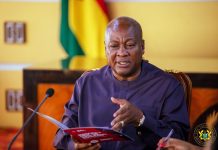Ghana’s debt management has become increasingly pro-cyclical, driven by electoral and commodity cycles and lacking adequate fiscal buffers to absorb external shocks, according to findings by the Economic Governance Platform (EGP).
Launching its Debt Sustainable Management Report in Kumasi, the Platform revealed that fiscal slippages during election years, coupled with poor expenditure controls and weak institutional checks have worsened the country’s vulnerability.
The report, supported by Open Society Africa, draws on research conducted across three thematic areas: debt frameworks and mechanisms, transparency and accountability, and debt sustainability and mitigation.

The report paints a sobering picture of Ghana’s debt and fiscal governance landscape, but also provides a roadmap for sustainable reform.
With the right political will, institutional alignment and public accountability, EGP believes Ghana can rebuild trust in its economic management and chart a path toward debt sustainability and inclusive development.
Speaking at the launch, EGP Coordinator Mr.Abdulkarim Mohammed said Ghana’s fiscal system remains plagued by inefficiencies, citing over-reliance on borrowing, misreported debt levels, and systemic lapses in procurement and public investment decisions.
“The economy’s limited capacity to withstand shocks is largely due to unsustainable public spending. Our debt trajectory is shaped not by strategic planning, but by elections and volatile global markets,” he said.
Distorted Debt Metrics and Procurement Failures
Mr.Abdulkarim criticized the government’s historical underreporting of debt. He disclosed that while official figures pegged the debt-to-GDP ratio at 75.9%, the joint IMF-World Bank Debt Sustainability Analysis (DSA) placed Ghana’s debt at 105% of GDP in present value terms, declaring the country in debt distress.
He further revealed that the external debt service-to-revenue ratio had reached 34%, nearly twice the sustainability threshold of 18%.
“The official figures excluded liabilities from financial sector bailouts and energy arrears. Instruments like the ESLA and DAAKYE bonds reduced fiscal space and transparency,” he explained.
He also cited the Bank of Ghana’s excessive deficit financing,later flagged in the IMF review, as a contributor to inflation and macroeconomic instability.
The report also found that between 2012 and 2021, nearly 86% of high-value public contracts were awarded via sole-sourcing or restricted tendering.
“This undermined value for money and opened the door to inflated pricing and contract irregularities,” Mr.Abdulkarim noted.
Recommendations to Avert Future Crises
To address these structural flaws, EGP issued a comprehensive set of policy recommendations:
Strengthening Revenue Mobilization
The Platform urged the government to broaden the tax base and tackle leakages through digital reforms and targeted tax education. It noted that Ghana loses about 4% of GDP annually targeted tax education. It noted that Ghana loses about 4% of GDP annually to tax exemptions on VAT, income tax, and import duties. Closing these loopholes, especially in the extractive sector, could significantly boost domestic revenue.
Combating Corruption and Leakages
EGP recommended stronger resourcing for anti-corruption agencies such as the Office of the Special Prosecutor (OSP) and EOCO, and advocated for the use of blockchain and advanced audit technologies to trace public funds and prevent diversion. Regular audits and enforcement of anti-money laundering laws were also stressed.
Expenditure Efficiency and Oversight
Describing current spending patterns as “rigid and inefficient,” EGP urged the government to streamline payroll, reform procurement, and consider establishing a Department of Government Efficiency or a credible, independent Fiscal Council. It emphasized the need for Parliament to exercise tighter control over borrowing and fiscal decisions.
Legal and Institutional Reform
EGP called for amendments to the Fiscal Responsibility Act and Public Financial Management Act to set explicit limits on deficits and debt accumulation. It proposed that escape clauses only apply under emergencies, with mandatory timelines for returning to fiscal discipline. The absence of a legally mandated Fiscal Council was flagged as a critical institutional gap.
Transparent Budget Execution
The coalition advocated for full integration of all government agencies into GIFMIS and GHANEPS, ensuring that only projects with budget approval proceed. “This aligns with Ghana’s IMF program and will help limit fiscal slippage,” Mr.Abdulkarim said.
Debt Sustainability Framework and Sinking Fund
EGP recommended institutionalizing a forward-looking Debt Sustainability Framework (DSF) that includes stress testing, risk mitigation, and project appraisal—especially for public investments exceeding US$1 million. It also called for the revival of the Sinking Fund with regular contributions, backed by parliamentary oversight.









